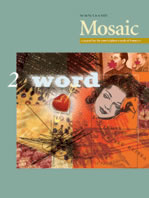Issue 36.2
Overview

General Issue
Published: June 2003
View the issue introduction or see the issue summary and contents below.
10 essays, totalling 192 pages
$15.00 CAD
In this general issue of Mosaic, narratives of nation and power are examined, questioned, challenged, and complicated. Nationalities, race, and identity from around the world are central in essays that explore British justice through Savoy operas, Haitian and Dominican identity in the wake of massacre, and the colonialism of the Tok Pisin language of Papua New Guinea. Other essays examine the relation between Christianity and the other, uncertainty in post-war poetry, and the concept of patchwork in How to make and American Quilt.
Life Plus Ninety-Nine Years: W.S. Gilbert and the Fantasy of JusticeJon Kertzer Gilbert and Sullivan’s operas are satires about the law illustrating how judicial reasoning stretches into fantasy to fulfill a logical demand for a symbolic, redemptive accord between crime and punishment. The disjunction between justice and law provokes confusion resolved imperfectly but delightfully through the legal absurdities and musical harmonies of romantic comedy. | |
Walking the Web in the Lost London of Mrs. DallowayAndelys Wood In Mrs. Dalloway, landmarks of 1920s London offer readers a web of spatial and temporal relationships: the novel’s walks are located specifically but also problematically. Attention to Woolf’s careful interweaving of time and place leads to fuller understanding of Mrs. Dalloway and of the London in its pages. | |
Niugini i Bekim Tok: Creolizing Global English in Papua New Guinean LiteratureJuniper Ellis Papua New Guinean languages and literatures unsettle the English dominance that both proponents and opponents of global English claim. That world language takes new shapes in Oceania, as seen when John Kasaipwalova structures his fiction so that colloquial English carries the grammar, syntax, and semantics of Tok Pisin. | |
Patchwork, or the “Pile-Up of Possibles,” in How to Make an American QuiltGéraldine Chouard Multiple, polymorphous, variegated, the paradigmatic motif of patchwork generates the weft and the weave of the meaning of Whitney Otto’s kaleidoscopic text and sets it squarely in the quintessentially American domain of the “pile-up of possibles” (Lachaud). | |
Both Sides of the Massacre: Collective Memory and Narrative on HispaniolaKelli Lyon Johnson Julia Alvarez and Edwidge Danticat reveal how Dominicans and Haitians remember and commemorate the atrocities of Rafael Leonidas Trujillo’s regime. While historical discourse is often inaccessible to marginalized communities, Alvarez and Danticat create narrative space that includes the experiences of women and revalues their role in the preservation of collective memory and the construction of national identity. | |
Under the Ribs of Death: Immigrant Narratives of Masculinity and NationalityLatham Hunter Given John Marlyn’s emphasis on Canadian social history, it is important to consider his protagonist’s relationships with all the male characters in Under the Ribs of Death; Marlyn’s depiction of the male immigrant’s masculinity and maturation is heavily informed by World War I and the inter-war years. | |
Durrell’s The Revolt of Aphrodite: Nietzschean InfluencesJames Gifford Although The Revolt of Aphrodite is often considered an aberration in Lawrence Durrell’s career, its scholarship insufficient compared to that of The Alexandria Quartet and The Avignon Quintet, the author argures that The Revolt makes significant contributions to Durrell’s oeuvre and to modernist debates. | |
The Artist in Word and Image of Gertrude Stein’s Dix portraitsAmy Blau The illustrated Dix portraits brings literary portraits by Gertrude Stein together with drawings of her subjects. Stein uses her portraits of artists to depict her own literary genius and acknowledges only Picasso as an artistic genius equal to herself; his self-portrait underscores their reciprocal understanding and creative primacy. | |
George Oppen’s Silence and the Role of Uncertainty in Post-War American Avant-Garde PoetryBurt Kimmelman George Oppen’s embrace of silence in his work, both in the way he writes and in his philosophy, shows the influence of post-classical science and mathematics, an influence that extends to avant-garde poets writing after World War II and that situates Oppen as a key figure among them. | |
Spilling the Names of God: Robin Blaser’s The Last SupperMiriam Nichols The Last Supper, an opera with a libretto by Robin Blaser and score by Sir Harrison Birtwistle, offers a millennial review of Christian history and practice. This essay focusses on Blaser’s libretto to explore the significance of his poetics of the sacred for contemporary secular culture. |